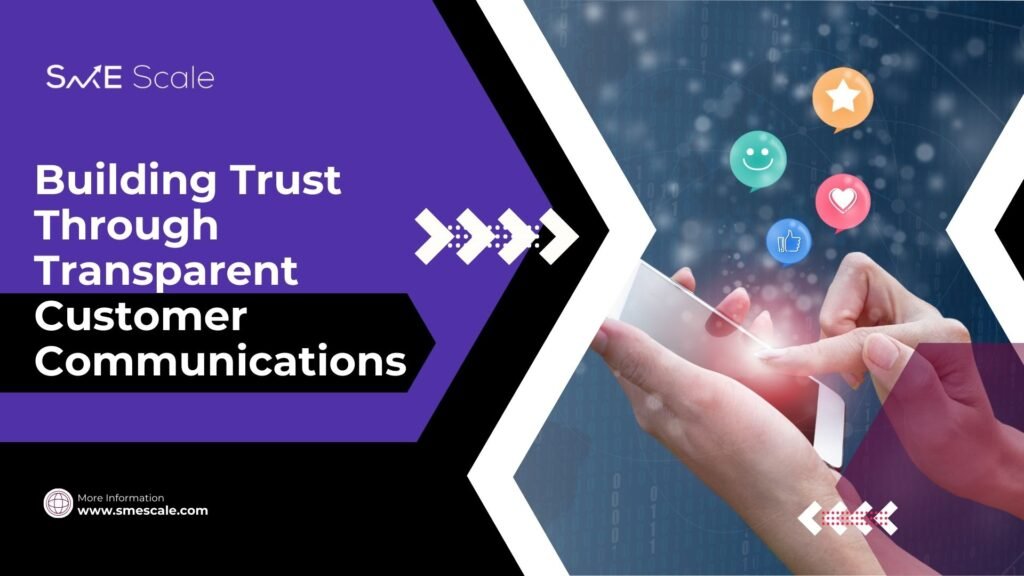Building Trust Through Transparent Customer Communications: A Strategy for SMEs

In today’s competitive business landscape, building trust is crucial for any brand aiming to foster long-term relationships with its customers. For small and medium enterprises (SMEs), the most effective way to earn and maintain that trust is through transparent communication. By being clear, honest, and open with customers, businesses can create stronger connections, increase customer loyalty, and enhance their overall brand reputation.
At SME Scale, we emphasize the importance of trust as a cornerstone of business growth. In this blog, we’ll explore how to build trust through transparent customer communications, using real-life examples to highlight successful marketing methods, and uncovering the psychology behind why this approach is so effective.
Why Transparent Communication Matters
Transparent communication involves being open about your products, services, processes, and any challenges your business might face. In an era where customers can easily verify information online, transparency has become more than just a strategy—it’s a necessity. According to a study by Label Insight, 94% of consumers are more likely to be loyal to a brand that offers complete transparency.
For SMEs, transparent communication helps:
Build Credibility: When customers feel that a brand is honest and straightforward, they are more likely to trust its offerings.
Foster Loyalty: Transparent businesses are often seen as more reliable, which fosters long-term relationships.
Improve Customer Experience: Open communication makes it easier to set clear expectations, reducing misunderstandings and dissatisfaction.
Key Strategies for Building Trust with Transparent Communication
1. Be Honest About Product Features and Limitations
Honesty is key when marketing products or services. Instead of overselling or exaggerating the benefits, focus on providing accurate information about what customers can expect. If your product has limitations, be upfront about them. This transparency allows customers to make informed decisions, which builds trust and reduces the likelihood of dissatisfaction.
2. Provide Clear Pricing and Terms
Hidden fees or unclear pricing models can quickly erode customer trust. Make sure your pricing is straightforward, and any potential additional costs are disclosed upfront. Clear terms and conditions, especially for contracts or subscriptions, demonstrate that you value your customers’ understanding of what they are committing to.
3. Own Your Mistakes
Every business makes mistakes. The key to maintaining trust is how you handle those errors. Own up to mistakes quickly and take steps to correct them. Whether it’s a delayed shipment, a product defect, or a service issue, acknowledging the problem and offering a solution demonstrates integrity and a commitment to customer satisfaction.
4. Use Transparent Communication in Marketing Campaigns
Transparency should be a core element in your marketing campaigns. Avoid clickbait or deceptive advertising. Instead, focus on building campaigns that communicate your value proposition clearly and truthfully. Share behind-the-scenes insights, showcase real testimonials, and be clear about what makes your brand unique without inflating claims.
Real-Life Case Study: How SME Scale Helped a Small Business Build Trust
Let’s take a closer look at how SME Scale applied transparent communication to help a small business foster customer trust.
The Challenge: Peterson Crafts, a family-run artisanal business, was experiencing slow growth despite offering high-quality products. The issue stemmed from customer confusion about product pricing, shipping times, and the materials used in their crafts. Customers often felt misled, leading to negative reviews and reduced repeat business.
The Solution: SME Scale stepped in to revamp Peterson Crafts’ communication strategy. First, they overhauled the product descriptions on the website, clearly outlining what materials were used, where they were sourced from, and how long each product would take to craft and deliver. They also introduced a transparent pricing model, ensuring customers knew exactly what they were paying for, including any additional shipping or customization fees.
Additionally, SME Scale worked with Peterson Crafts to create a “Behind the Scenes” section on their website, where they shared stories about the crafting process, introduced the team, and provided updates on their sustainability efforts. This gave customers insight into the brand’s values and operations, enhancing trust.
Results: Within three months, Peterson Crafts saw a 35% increase in repeat customers, and their customer satisfaction ratings improved by 20%. The transparency not only fostered trust but also attracted a community of loyal customers who valued the brand’s honesty and craftsmanship.
Psychology Behind It: The success of Peterson Crafts can be tied to the psychological principle of reciprocity. When a business is transparent and trustworthy, customers feel a sense of obligation to reciprocate by supporting the brand. Additionally, transparency creates a perception of authenticity, which is a key driver of trust. People are more likely to trust brands that are perceived as authentic because they feel more relatable and human.
The Psychology Behind Transparent Communication
Transparency in communication is backed by several psychological principles. One key concept is cognitive dissonance, where people experience discomfort when their expectations do not match reality. By being transparent, you prevent cognitive dissonance from occurring because customers know exactly what to expect.
Another psychological principle at play is the halo effect. When a business demonstrates honesty and integrity, customers are more likely to attribute other positive qualities to the brand, such as competence and reliability. This creates a positive perception that extends beyond just the product or service being sold.
Conclusion
Building trust through transparent customer communication is not just a strategy—it’s a long-term investment in your business’s reputation and customer relationships. By being open about product details, pricing, and mistakes, and by using transparent marketing tactics, SMEs can foster loyalty, attract new customers, and drive sustainable growth.
At SME Scale, we specialize in helping businesses create transparent communication strategies that not only build trust but also boost engagement and sales. By integrating psychological insights and real-world marketing methods, we guide businesses toward long-lasting success.


